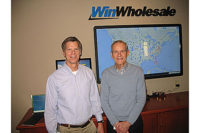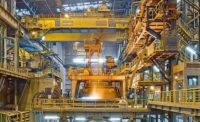
Integrated supply got knocked out of the news by "hype over e-commerce," but it is one of the hottest things going in the industrial MRO market, according to Frank Lynn of the Chicago-based Frank Lynn & Associates supply chain consulting firm. Integrated supply refers to the practice of distributors managing the MRO needs of industrial users, often under a single-source contract.
"Integrated supply has about 25% of the MRO business in large plants," Lynn told an audience at the Prophet 21 Summit conference in Orlando on April 5. Previewing a soon-to-be released study by his firm on integrated supply, Lynn recited some stunning findings:
- The Frank Lynn study found 17 companies with revenues of more than $100 million involved with integrated supply. Included among them were PVF giants such as McJunkin,Westburne and Ferguson's integrated supply unit.
- Integrated supply grew at an average rate of about 18% during the 2000-2001 period, at a time when the MRO market was off 7-10%.
- Lynn expects integrated supply growth of 25% or more for 2002. "It's doing great things," he said. "Companies involved with integrated supply are averaging 4-5% pre-tax profit. Industrial distributors without it are barely making money."
According to Lynn, integrated suppliers are the leading wave of a trend that finds distributors changing from inventory managers into service companies. "Inventory is moving out of branch offices into regional distribution centers," said Lynn. "Industrial distributors are going to see their inventory role decline, and it will happen quickly. When you see manufacturers getting away from the 25% discount and starting to give separate inventory and product support discounts, you'll know it's happening."
Stealthy E-commerce
In a separate but related program at the Prophet 21 Summit, Lynn spoke about the tantalizing subject, "E-commerce Is Returning In Stealth Mode." He said that "e-commerce got it right, but tried to do too much. There were too many business models and behaviors that had to change, but you can't change an entire system in a short time."
According to Lynn, e-commerce promoters failed to identify where the economic leverage was. "Manufacturers bristled at paying transactional fees that didn't benefit them. It was the right church, but the wrong pew. The economic gold in industrial distribution is developing software to automate specific tasks in the supply chain. They tried to automate the entire supply chain. This will eventually happen, but not in a year or two," said Lynn.
Nonetheless, wholesalers who have adopted technology in a big way are some of its biggest beneficiaries. He noted that logistics costs were reduced from 30% to 20% of GNP between 1980 and 1995. "Logistics systems are so efficient today, a distributor with six regional warehouses can deliver overnight to about 80% of the country.
"That's why distributors are taking most of their inventory out of their branches," he noted. "The typical industrial distributor turns inventory four to five times a year. That will grow to eight or nine, with drop shipments to plants increasing. This reduces inventory investment costs and changes the business model. The inventory role is diminishing, and the service role must increase," said Lynn.


